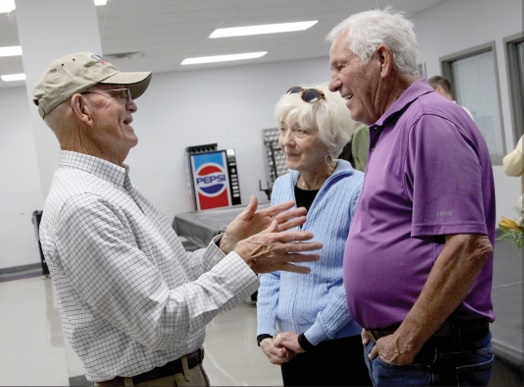Denali runoff incident detailed
Petition being formed to gain state’s attention
By Sheila Harris sheilaharrisads@gmail.com
On March 9, Denali Water Solutions — via a telephone call and statement from communications director Samuel Liebl — disclosed an incident involving runoff from land-applied food-processing residuals by a Denali subcontractor occurred in McDonald County on March 1.
“The residuals ran down a hillside,” Liebl said in an emailed statement.
Brooks McNeil, with the Southwest Regional Office of the Missouri Department of Natural Resources (DNR), said a neighboring landowner’s property, as well as a tributary of Indian Creek, appeared to have been impacted.
“The neighbor was not land-applying the residuals on his own property,” McNeill said.
“As soon as Denali became aware of the incident, Denali employees followed the company’s safety and environmental compliance protocols, which included contacting Denali supervisors, communicating with regulatory authorities, promptly, and filing an incident report,” Liebl’s email stated.
Denali is working transparently with the Missouri Department of Natural Resources (DNR) as it conducts an investigation of the incident, Lieble said.
Brooks McNeill said the incident occurred near Spruce Drive (northwest of Denali’s Gideon Lagoon) in McDonald County.
McNeill said he began an on-site investigation Thursday, when he met with the neighboring landowner and representatives from Denali to discuss possible causes of the incident.
“We took water samples and field measurements which include testing water temperature, pH and dissolved oxygen content, and specific conductivity [which can gauge total dissolved solids] — all standard tests for water-quality investigations,” McNeill said.
The results of the tests will not be available right away, McNeill said.
According to McNeill, the March 1 runoff incident is atypical.
“I’ve been investigating these types of incidents involving various companies since 2007,” he said. “Discharges [like this] from application areas are relatively uncommon.”
Such incidents are what southwest Missouri residents, including Caleb Wardlaw, of McDonald County, who are opposed to Denali’s land-application of residuals have been fearing.
After a gathering of concerned landowners with state officials and representatives of Denali in Neosho in February, Wardlaw formed a Facebook group called Sludge in SW MO: Facts, Hearsay, Opinions, Action. The group is receiving significant community input.
One action measure resulting from the group is the formulation of a petition, which will soon be available for residents’ signatures.
“The main purpose of the petition is to hopefully catch Governor [Mike] Parson’s attention and let him know we have concerns,” Wardlaw said.
An area of particular concern to Wardlaw is that Denali’s waste residuals are categorized as “fertilizer.”
“I’d like to see Denali’s (and other such companies’ practices) be taken out of the hands of the Missouri Fertilizer Control Board, and their waste be labeled as just that, waste – not fertilizer — and be subject to DNR oversight,” he said.
Barry County Emergency Management Director David Compton has concerns along the same line, and he believes, contrary to current definition, that the Denali storage lagoons in McDonald and Newton Counties do meet the definition of “agrichemical facilities.”
“When waste residuals from different companies are co-mingled in the same lagoons, those lagoons essentially become processing facilities and should be subject to DNR oversight,” Compton said.
Wardlaw would like to see a moratorium placed on the construction of any more Denali storage lagoons in Missouri.
“To date, the [DNR] has not been made aware of any additional basins planned for the area,” McNeill said. “But, on the other hand, if a company chooses to build a basin to store a registered fertilizer, it doesn’t have to notify the DNR, so my office might not necessarily know about it.”
Representatives with Denali are not strangers to public outcry.
According to a January 2020 article in the Springfield News-Leader (http://tinyurl. com/mrc6mfrc), after pressure from environmental groups, the State of Arkansas bought out and shut down the operations of C&H Hog Farms in 2019. The farms, where some 6,000 head of hogs were raised, were located in the Buffalo National River Watershed, adjacent to a creek which flowed into the nationally protected river.
After the closure, the State of Arkansas contracted with Denali to remove 2.63 million gallons of liquid hog feces and urine from two lagoons on the farm. The cleanup began in January of 2020, with the understanding that the hog waste was being removed to a permitted site. That site happened to be 1,200 acres of privately-owned land in Taney County, Mo., just north of the Arkansas line.
In a March 15, 2020, Springfield News-Leader article (http://tinyurl. com/mrxzsstz), Denali Operations Coordinator Mike Dortch, said the Taney County location was the closest acceptable site for the land-application of hog waste outside of the Buffalo River watershed. We found it “by us going knocking on doors,” he told the News-Leader.
DNR investigators were called to the site at the request of Taney County officials, but found no evidence of over-application of the waste, according to the News-Leader article.
“The Department does not have application rate requirements for this sort of situation, but we do provide recommendations,” Missouri DNR’s Southwest Regional Office then-Director Cindy Davies told the News-Leader in 2020.
She added that bringing hog waste across state lines was not illegal.
Not much has changed, except that Denali now owns two 2-million-gallon storage lagoons located on private property in southwest Missouri.
A lagoon two miles south of Fairview in Newton County is located on the property of Jerry Evans and was put into use in late 2020. The Evans Lagoon was constructed with a compacted clay liner, known only because Denali submitted construction plans for the lagoon to the DNR prior to its construction, although they were not required to, said Heather Peters, with the DNR’s Watershed Protection Section.
According to Peters, no such plans were submitted for the Gideon Lagoon in McDonald County, completed the following year.
The DNR investigation of the March 1 runoff incident in McDonald County is ongoing, said Brooks McNeill.
Liebl said Denali is taking corrective actions to prevent similar incidents from occurring with the subcontractor involved.
“In this case, cleanup methods used have included working with the landowner to move dirt to create berms, incorporating the food processing residuals into the soil where the runoff occurred, and sowing grass seed so that the hillside is more protected from erosion,” he said.
If members of the public observe Denali or its subcontractors engaging in what they perceive to be unsafe or improper activities, Denali asks that they contact Denali’s main office in Russellville, Ark., by calling 479-4980500, so that Denali can investigate and correct the situation as soon as possible. If the situation is an emergency, Denali asks residents to contact local emergency responders.
If runoff of wastewater residuals onto neighboring properties or into waterways is observed, the Southwest Regional Office of the DNR may be contacted at 417891-4300. The current regional director is Tanya Turner.
“Liebl said Denali is taking corrective actions to prevent similar incidents from occurring with the subcontractor involved. ‘In this case, clean-up methods used have included working with the landowner to move dirt to create berms, incorporating the food processing residuals into the soil where the runoff occurred, and sowing grass seed so that the hillside is more protected from erosion,’ he said.”




